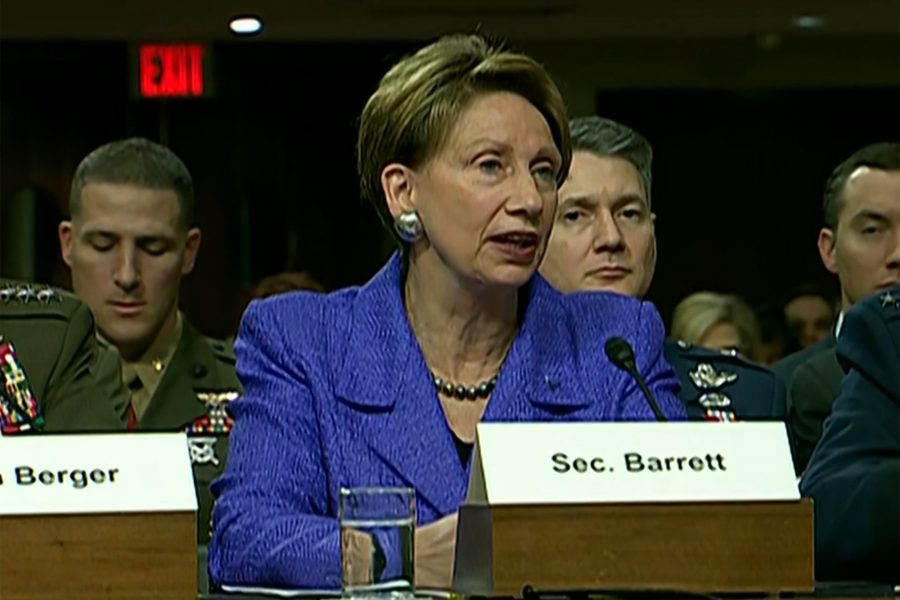Air Force Secretary Barbara Barrett on Dec. 3 told senators the service is ready to roll out a new “bill of rights” for airmen living in privatized military housing as soon as Congress passes a fiscal 2020 defense policy bill, now two months overdue.
“We’re ready to go—could have issued it earlier but don’t want to issue something today that then lies in contrast with what the [National Defense Authorization Act] might come out with,” she told Sen. Rick Scott (R-Fla.) at a Senate Armed Services Committee hearing on substandard housing.
Rather than issue the tenant bill of rights now and reconcile the differences with the law later, Barrett said the Air Force would rather wait and be consistent.
Earlier this year, the military services together proposed a draft bill of rights for service members who choose to live in homes managed by private companies. Though the quality of life in privatized housing varies by base and home, the Defense Department is trying to fix thousands of issues involving mold, fire code compliance, vermin, lead-based paint, and more.
The bill of rights would entitle tenants to withhold pay from landlords while disputes are being decided, offer access to housing advocates, and allow third parties to adjudicate landlord-tenant disagreements, among other benefits.
The Air Force has 32 of the military’s 79 privatized military family housing projects. Fourteen companies manage housing for DOD. Some are eager to see officials who are at fault get fired, but the reality is more complicated. Blame is spread across multiple echelons of company and military leadership for problems ranging from willful neglect to lacking the ability to conduct meaningful oversight.
Elizabeth Field, the Government Accountability Office’s defense capabilities and management director, told lawmakers that at Camp Lejeune, N.C., and Tinker AFB, Okla., the local military housing offices said they had recommended to senior service leadership for years that underperforming companies should not earn financial incentives intended for good work. But groups like the Air Force Civil Engineer Center never took that advice, Field said.
Balfour Beatty Communities, an Air Force housing provider whose work the service has repeatedly criticized, isn’t receiving performance incentive pay, Barrett said. In October, the service requested an improvement plan to fix the company’s “unacceptable” failures that is due by the end of the year.
Reuters reported in July that the Air Force stopped paying incentives at Balfour Beatty’s 21 military housing locations after the news service and CBS News revealed the company falsified maintenance records to qualify for extra pay. Balfour Beatty manages 15,500 homes at Air Force bases, according to Reuters.
The service now wants to restructure its incentive fees to reflect feedback from local commanders who inspected housing, and to account for health and safety issues in a home.
Sen. Joe Manchin (D-W.V.) suggested the bill of rights should allow tenants to form homeowners associations that can open civil lawsuits against companies for shoddy housing management. That would deter landlords from neglecting their residents, Manchin argued.
On Dec. 2, the law firm Berger Montague PC announced it and another firm filed a class action lawsuit over mold exposure in military homes at MacDill AFB, Fla. Defendants include the Michaels Organization, Michaels Management Services, Interstate Realty Management Company, AMC East Communities, Clark Capital Realty, and Harbor Bay at MacDill, according to a Berger Montague release.
“The lawsuit alleges that when notified by residents of the moisture and mold problems, defendants failed to adequately address the issues, denied the existence and severity of the problems, delayed in responding appropriately, refused to share moisture and mold tests with residents, and engaged in inadequate and shoddy remediation efforts,” the firm’s release stated. “One plaintiff and his family spent 58 days in temporary housing during a seven-month period in 2019, and another had mold mushrooms growing out of the floor and carpet in his residence.”
MacDill, Tinker, and Keesler AFB, Miss., all were designed or built in ways that allow mold to grow, USAF leaders said in written testimony.
The Air Force has started addressing thousands of needed fixes in the past year, and finished an inspector general investigation into privatized housing that was submitted to Congress. The service is also adding more employees so it can ensure that all homes have had adequate maintenance before new tenants move in. That would mark a change from the past policy of inspecting 10 to 20 percent of units that underwent maintenance for new residents.
“We cut too many personnel who provided oversight for projects and failed to fully empower the chain of command to own and fix these issues,” Barrett added. “As a result, housing problems have distracted from the Air Force mission. They have disrupted our airmen and dislocated their families. This is unacceptable.”
